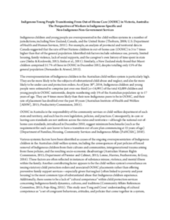This article investigates the current leaving care and post-care supports that are available to Indigenous care leavers. According to the article, Indigenous care leavers seem to face particular challenges, including poor educational experiences, disproportionate levels of involvement with the youth criminal justice system, high levels of early pregnancy, varying levels of connection to their cultures and communities, and a loss of identity. The researchers in this article used focus groups to investigate its questions and conclusions.
This document identifies the causes of the ongoing over-representation of the Indigenous child population in Australian welfare system. According to the document, key factors often include instances of substance misuse, violence, and mental illness within the family. Overreliance on issuing statutory child protection order in preference to providing preventive family support tends to be another factor. The article further notes that there seems to be a lack of “cultural competence” within child protection services concerning Indigenous family dynamics, cultures, and traditions.
The focus groups did not identify any major differences in the leaving care services delivered by Aboriginal Community Controlled Organizations and mainstream child welfare agencies in terms of supporting Indigenous care leavers. It appears that both types of service providers adopt a voluntary model and support Indigenous care leavers in identifying their needs. The service providers attempt to access appropriate supports and resources to meet these identified needs primarily through post-care services (such as housing, for example).

